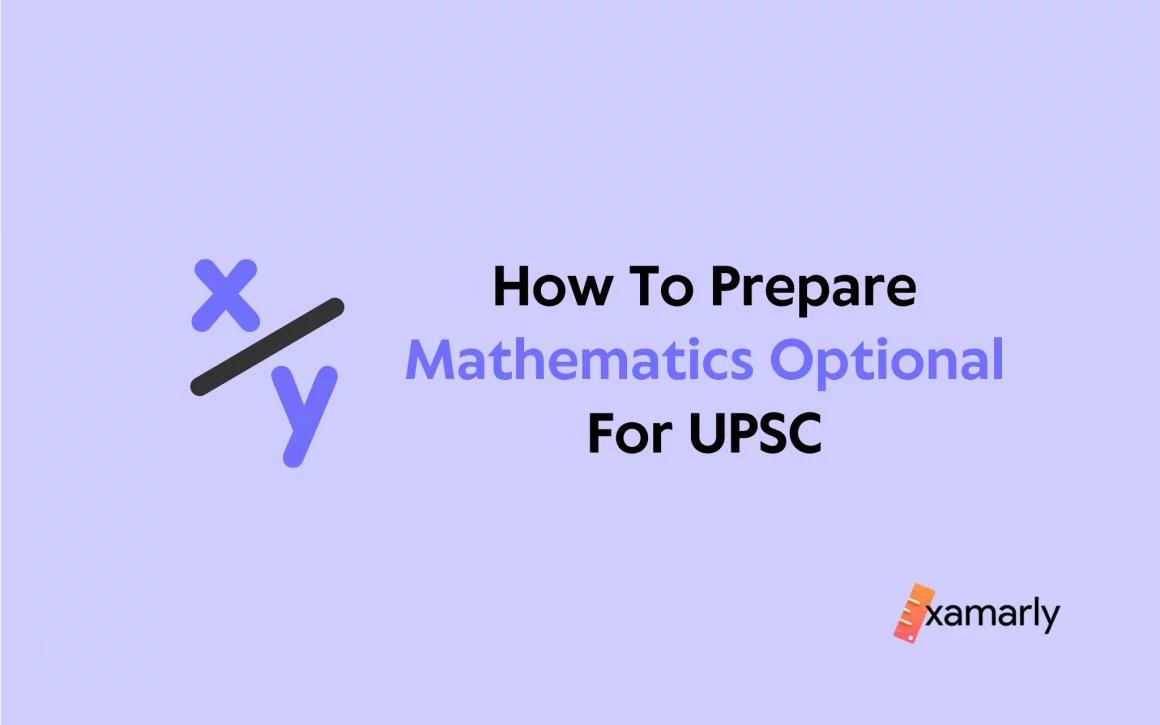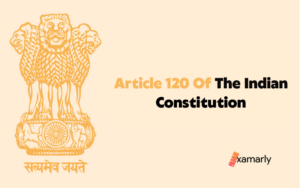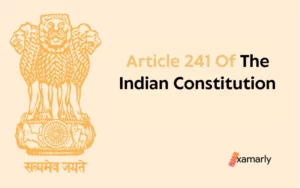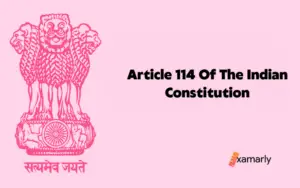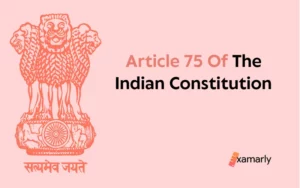How to prepare Mathematics Optional for UPSC CSE is one of the popular questions among students regarding the optional Papers. Choosing an optional is not an easy task. Your decision should be well based about selecting optional subject for UPSC.
With complex theorems revolving around, the first and foremost thing to be considered while choosing the optional should be your keen interest and the your background. In this article, we’ll provide tips & strategies revolving around the question “how to prepare mathematics optional for UPSC?”.
Note:
Optional subject has two papers, namely Paper-I and Paper-II in UPSC Mains Exam. Each paper is worth 250 marks, thus making a total of 500 points marks.
- Advantages of Taking Mathematics Optional for UPSC
- Disadvantages of Taking Mathematics Optional for UPSC
- Who Should Opt for Mathematics Optional for UPSC?
- 4 Effective Methods to Prepare for Mathematics Optional for UPSC
- 7 Tips on How to Prepare Mathematics Optional for UPSC
- Book List to Prepare Mathematics Optional for UPSC
- UPSC Toppers with Mathematics as an Optional
- Conclusion
- FAQs on How to Prepare Mathematics Optional for UPSC
- What should be my approach for Maths Optional for UPSC?
- Which are the best books for Maths Optional for UPSC?
- Is it necessary to have a strong background in Maths to opt for Maths Optional?
- How many hours should I dedicate for Maths Optional for UPSC?
- How many marks are expected from Maths Optional in UPSC?
Advantages of Taking Mathematics Optional for UPSC
It doesn’t matter if the exam is UPSC CSE or some other exam, Math is always a scoring subject. Theorems & concepts like curve tracing & linear transformation are doable for people who come from mathematical backgrounds.
If you are well versed in this subject and have a strong background in it, then you will most probably score high marks. So before jumping into an answer, let’s look at the merits of choosing maths optional for UPSC.
- Doable Questions: Questions often come from textbooks with easy to medium degrees of difficulty. If you are well equipped in this subject then the questions are doable for you. With practice and understanding, you will be well versed in no time in UPSC Mains mathematics paper.
- Competition is limited: Compared to other UPSC Mains papers such as history or geography, mathematics optional has minimal competition or is limited. As most of the aspirants are not fond of mathematics.
- Have a clear picture: After writing a paper, you have a clear picture in your mind about how you have done the paper or how correctly you have written the paper. In other subjects, say humanities, two examiners might give you different numbers for the same answer due to the involvement of subjectivity along with the examiner’s own perspective. But in mathematics, this is not the case.
- The syllabus is static in nature: Current affairs have no role in this subject. This means if you have completed the maths optional syllabus for UPSC CSE, you have to keep practicing instead of updating your knowledge like that in current affairs. The more you practice, the more firm will be your grip on this subject.
- Scoring in nature: This paper is scoring in nature. Questions are not opinion-based in this optional paper as there can be only one correct answer. Scoring in mathematics is rather straightforward – if correctly solved you get a mark.
- Background advantage: If you have studied mathematics in the under graduation or post-graduation, then already you have knowledge about the concepts/facts which means you only need to brush up and requires only practice to be skilled in working out the solution.

Disadvantages of Taking Mathematics Optional for UPSC
This optional paper has no such cons that will refrain someone from choosing it as it’s advantages are suppressing the disadvantages. Some of the downsides of selecting mathematics as the optional paper in the UPSC CSE are given below:
- Preparation may take time: Being a logical subject, it is practical in nature. That means, to cover its syllabus you need to figure out the process to obtain solutions rather than cramming it all.
- Not useful for GS paper: Since the syllabus of mathematics does not overlap with GS paper, preparation of mathematics will not be helpful for GS preparation like other subjects.
- Marks are not given for attempting: For wild attempts marks are not given, unless and until the solution is correct and rightfully directed by you.
Also Read: Negative Marking In UPSC Prelims.
Who Should Opt for Mathematics Optional for UPSC?
Mathematics optional should be chosen by aspirants who are interested as well as well versed in this subject. If you don’t have prior knowledge of this subject, or if you are not good enough in mathematics, or if this subject is not part of your stream, then choose any other optional subject for UPSC.
If you are interested in mathematics and want to take it as an optional, then you should have a clear concept of the subject. The best way to do this is by solving a lot of question papers. The more questions you solve, the better will be your chances of getting selected. If you opt for mathematics, then all you need is to practice and practice again.
To know more about/choose other optional subjects, read our blogs on:
- Best Optional Subject For UPSC.
- Most Scoring Optional Subject In UPSC.
- Easiest Optional Subject For UPSC.
4 Effective Methods to Prepare for Mathematics Optional for UPSC
Basic yet most effective methods on how to prepare mathematics optional for UPSC are given below:
- Know the complete syllabus: Before commencing your preparation for UPSC mathematics optional, go through the syllabus to know what to cover and what to skip. This will help you prepare yourself accordingly.
- Opt for best standard books: After knowing about all the topics involved in the paper, you need to select some good books from which you can study each topic in detail and practice. On further reading this article, you’ll find the booklist for the mathematics optional paper.
- Draft a study plan: Now, break your syllabus into sub-topics and make a study plan accordingly. In this way, you can easily manage your time and complete the syllabus according to your sketched schedule. Cover all important topics so that you can score good marks in UPSC’s mains optional subject. Practice more to be fluent on important topics.
- Take mock tests & solve previous year papers: Solve previous papers as this will help you get an idea about how questions are asked in these exams and what type of answers should be given while answering them.
Related Article: How Many Mock Tests Before UPSC Prelims.
7 Tips on How to Prepare Mathematics Optional for UPSC
Many aspirants who have chosen mathematics as an optional paper must be pondering on how to prepare, so we are here with the 7 most effective tips:-
- Practice: One of the key tips on preparing for mathematics optional is Practice. If you practice, you will not only polish your skills of solving problems efficiently but also enhance speed. It will also help you focus more and avoid silly mistakes. One way of practicing is to attempt the questions asked previously so as to be familiar with the nature of questions in your actual paper.
- Keep your eyes open: Avoid silly mistakes, while writing an answer, like copying wrong numbers or having missed the symbols which will cost you marks.
- Work out the problem systematically: Always write the solution neatly and write an answer step by step. Alongside the correct approach, a good and systematic presentation will fetch you marks. Don’t skip any important steps in a buzz, else you will repel marks. Write the solution with the proper steps.
- Understand the concepts: Instead of learning difficult topics, try to make a study plan and understand and practice them on your own to get well versed. Once you understand the logical nature of the flow, you will be able to solve any type of questions asked in UPSC. The more grip you have on theorems & concepts, more is the probability of solving the problems, hence the chance of scoring better.
- Read the question carefully: Before commencing to write the solution, read the question carefully. As you will lose precious time if you have started writing an inaccurate answer. If you figure the right solution later, you will be unable to reframe due to time/space constraints.
- Use a formula sheet: Have a formula sheet handy with you and memorize it. This trick will be helpful while solving a question or an equation. It will supercharge your ability while answer writing.
- Be relaxed: Being relaxed is another important tip. Instead of panicking or being confused, keep your mind relaxed while solving to perform well in your paper. Practicing a good time management routine during your preparation will help you immensely. Panicking will only increase your chances of marking a wrong answer and losing marks.
You Might Also Like To Read: Time Management For UPSC.
Book List to Prepare Mathematics Optional for UPSC
With basics from the NCERT and other suggested reference books by toppers, you can give a sharp edge to your preparation. Here’s the booklist we mentioned about helping you prepare mathematics optional for UPSC.
Maths Paper-1
- Linear Algebra:
- Schaum Series – Seymour Lipschutz.
- Linear Algebra – Hoffman and Kunze.
- Calculus:
- Mathematical Analysis – S C Malik and Savita Arora.
- Elements of Real Analysis – Shanti Narayan and M D Raisinghania.
- Analytic Geometry:
- Analytical Solid Geometry – Shanti Narayan and P K Mittal.
- Solid Geometry – P N Chatterjee.
- Ordinary Differential Equations (ODE): Ordinary and Partial Differential Equations – M D Raisinghania.
- Dynamics and Statics: Krishna Series.
- Vector Analysis: Schaum Series – Murray R. Spiegel.
Maths Paper-2
- Algebra: Contemporary Abstract Algebra – Joseph Gallian.
- Real Analysis: The same as Calculus of Paper-1.
- Complex Analysis: Schaum Series – Speigel, Lipschitz, Schiller, Spellman.
- Linear Programming: Linear Programming and Game Theory – J.G. Chakraborty & P. R. Ghosh.
- Partial Differential Equations:
- The same as ODE of Paper-1.
- Advanced Differential Equations – M D Raisinghania.
- Numerical Analysis and Computer Programming:
- For Numerical Analysis:
- Computer Based Numerical and Statistical Techniques – M.Goyal.
- Numerical Methods – Jain, Iyengar and Jain.
- For Computer Programming: Digital Logic and Computer Design – M. Morris Mano.
- For Numerical Analysis:
- Mechanics and Fluid Dynamics: Krishna Series.
UPSC Toppers with Mathematics as an Optional
The Union Public Service Commission (UPSC) Civil Services Examination is a highly competitive examination in India and selecting Mathematics as an optional subject has proven to be a successful choice for some of the recent toppers.
Here’s a more in-depth look at some of the recent UPSC toppers with Mathematics as their optional subject:
- Anudeep Durishetty (2017) – Anudeep Durishetty topped the UPSC Civil Services Examination in 2017 with Mathematics as his optional subject. He has a background in engineering and has worked in the private sector before appearing for the examination. He secured the first rank in his first attempt and has been a source of inspiration for many aspiring civil servants.
- Nandini K.R (2017) – Nandini KR is another topper from the year 2017 who secured the second rank with Mathematics as her optional subject. Nandini is a graduate in Electronics and Communications Engineering and has worked in the private sector for a few years before appearing for the UPSC CSE.
- Jasmeet Singh Sandhu (2018) – Jasmeet Singh Sandhu is a 2018 topper who secured the third rank with Mathematics as his optional subject. He too has a background in engineering and has been working as a software engineer before his exam.
- Junaid Ahmad (2019) – Junaid Ahmad is a 2019 topper who secured the fourth rank with Mathematics as his optional subject. He has a background in engineering.
- Jatin Kishore (2020) – Jatin Kishore is a 2020 topper who secured the seventh rank with Mathematics as his optional subject. Jatin has a background in engineering and has been working in the private sector before appearing for the examination.
Conclusion
The only formula to success is practice, and perfect practice. As this paper demands your time to practice, a relentless practice will ensure that you can score high. Although scoring, Maths can be difficult for some of us. So choose it as your optional subject if you like it & can undergo continuous revision. We hope this article helped you shape your decision.
You might also like to read:
FAQs on How to Prepare Mathematics Optional for UPSC
What should be my approach for Maths Optional for UPSC?
Your approach for Maths Optional for UPSC should be systematic, consistent and focused. Study from standard textbooks, solve previous year question papers, and practice regularly.
Which are the best books for Maths Optional for UPSC?
The best books for Maths Optional for UPSC are:
1) Higher Algebra by Hall and Knight.
2) Calculus by Thomas and Finney.
3) Differential Equations by A.D. Polyanin.
4) Vector Calculus by G.H. Hardy.
Is it necessary to have a strong background in Maths to opt for Maths Optional?
Having a strong background in Maths is helpful but not necessary to opt for Maths Optional in UPSC. However, having a good foundation and regular practice is essential.
How many hours should I dedicate for Maths Optional for UPSC?
It is advisable to dedicate at least 3 to 4 hours daily for Maths Optional for UPSC. The amount of time may vary depending on an individual’s speed and understanding.
How many marks are expected from Maths Optional in UPSC?
It is difficult to predict the exact number of marks one can score in Maths Optional for UPSC as it depends on various factors like the individual’s preparation, writing skills, etc. However, with consistent and focused preparation, one can aim to score between 300-350 marks.


